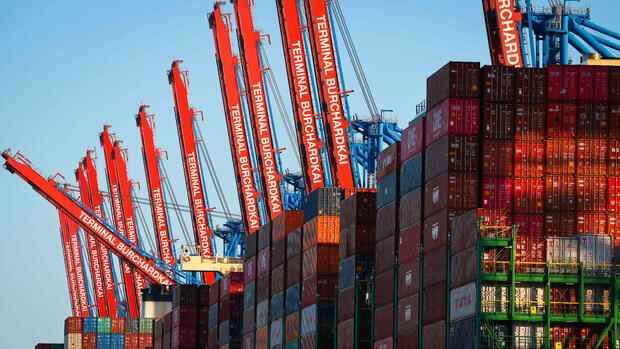In 2020, Germany accounted for around eight percent of global exports.
(Photo: dpa)
Berlin The German economy is doing well on the world market – at least for now. In 2020, Germany accounted for around eight percent of global exports, making it the third largest exporting nation in the world. This is the result of a study by the federal foreign trade promotion agency, Germany Trade and Invest (GTAI), which evaluated the latest comparable data. The study is available exclusively to the Handelsblatt.
While France’s export share of the global market fell by 1.8 percentage points between 2000 and 2020, Great Britain’s share by 2.4 percentage points and that of the USA by as much as 4.1 percentage points, Germany’s share of the world export market remained relatively stable and lost only 0.7 percentage points.
The strongest growth over the period was China, whose share of global exports grew by 11.1 percentage points.
“Germany has maintained its share of the world market despite difficult conditions,” says Achim Haug, Head of East Asia at GTAI. For the position of German companies on the world market, however, it is now crucial how, among other things, the rising prices for energy and raw materials can be compensated.
Top jobs of the day
Find the best jobs now and
be notified by email.
German industrial companies had recently sounded the alarm. According to the “Situational picture of medium-sized industrial companies” by the Federation of German Industries (BDI), more than 90 percent of companies in the industry see the rising prices for energy and raw materials as a “strong” (58 percent) or even “existential” challenge (34 Percent).
>> Read here: Why German companies are now warning of deindustrialization
China in particular is hot on the heels of German exports. In 2020, the companies from the People’s Republic for the first time left the German machine builders behind as export world champions – this year the gap between China and Germany will widen even further, believes East Asia expert Haug.
The Chinese companies are already ahead of the Germans in this area when it comes to exports.
(Photo: imago images/Rupert Oberhäuser)
The People’s Republic has long been the world leader in terms of exports of electrical engineering. China accounted for almost 27 percent of global shipments of equipment such as computers, laptops and other electronic goods, according to the GTAI study.
The German automotive industry, on the other hand, is still number one among the world’s largest exporters. “In the next few years it will depend on how German companies position themselves in the field of electromobility,” says Haug.
In the chemical industry, too, China is catching up at the expense of Germany
Germany lost slightly in global exports of chemical and pharmaceutical goods between 2000 and 2020, but according to the GTAI study it still holds the top position with a share of almost eleven percent. However, China is also catching up in this area – at the expense of Germany.
The People’s Republic is not only the toughest competitor for German exports, but also the largest market. Much of the growth in German exports over the past 20 years can be attributed to the Chinese market, says GTAI division manager Haug.
However, German exports increased most strongly to Central and Eastern Europe, with growth of 7.2 percentage points between 2000 and 2020, closely followed by the Asia-Pacific region, where the share of total exports increased by 6.3 percentage points. German companies were able to increase their exports to China alone by 6.4 percentage points.
Despite this development, according to the Federal Statistical Office, the most important buyer country for German goods in 2021 was the USA, as in previous years. China followed in second place, followed by France.
>> Read here: The China twilight: the country has changed so dramatically
In view of the increasing geopolitical tensions with Beijing, Berlin is currently working on a new strategy for dealing with the autocratic country. In recent months, the federal government has repeatedly called for the German economy to become more independent of the market in view of the increased risk involved in doing business in China.
According to a survey by the Cologne Institute for Economic Research (IW), German companies are significantly more dependent on the Chinese export market than vice versa. According to the IW, 2.7 percent of Germany’s overall economic value added and 2.4 percent of total employment depend on exports to China. In China, on the other hand, it is only 0.5 and 0.6 percent.
According to GTAI, the Chinese market is very important for German exporters, especially in the automotive, mechanical engineering, electrical engineering and chemical sectors. However, growth in the world’s second largest economy is faltering – with consequences for Germany. According to the latest data from the Federal Statistical Office, German exports increased by 14.3 percent in July 2021 compared to the same month last year, but exports to China only increased by 6.6 percent.
More: China’s foreign trade is slowing down – and with it the last pillar of the economy is shaking
